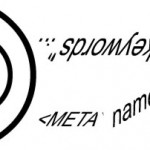With voice recognition software at its current high level of sophistication, new advancements in the search engine optimization field may become available. The target for this potential technology may be videos on the internet that are primarily made up of human speech. The purpose would be to scan the audio track of a video and then use voice recognition software to pick out discernible words. After words are picked out they can be used in a type of “META” tag that could be used to make Videos more relevant and searchable on Google and other search engines. This is important because currently, text based written articles receive the most, “weight” for searches online.
The reason why text based articles get weighted heavier than videos is because even though videos have descriptions and tags associated with them, text based articles have crawlable text that robots use to determine whether or not the META keywords are truly relevant to the actual article.
So in that regard videos that are about interesting topics with poignant information are at a disadvantage to text based articles. Many videos rely on sharing by multiple people on social media network sites or require articles being written about the video and then having the video embedded in the post itself.
One solution to this problem that overidon.com presents is the concept of Sonic Meta Tagging. The same kind of surveillance technology that is already being used to detect keywords in telephone communication can be implemented toward videos.
So a hypothetical example of how this could be used would sound like this:
A person named Jordan made a video on YouVideoMaximum.net (ficticious website) that is basically a webcam recording of him talking about his concerns on how hamburgers are prepared at fast food restaurants. Jordan added information to his description and titled his video with his name and the words, “Burger Concerns.” In the description there is a little information with a general summary of what he is talking about.
But let’s say YouVideoMaximum.net eventually uses Sonic Meta Tagging and so when the video file was uploaded, the entire 9 minute speech on the hamburgers was scanned by speech recognition software. Then YouVideoMaximum.net creates a virtual transcript of the entire audio portion of the video that is visible to the computer mainframe. This transcript is converted into Sonic META tags that are actually crawlable by search engine robots. The file for this type of transcript can be modified and manipulated by editing a control file that is directly responsible for Sonic Meta Tags called robots.vox (fictitious hypothetical file type).
What Jordan doesn’t realize is that his description is good, but there is information in his video regarding how employees use wipe their aprons with their gloves on and then proceed to make more hamburgers without changing the gloves. Jordan thought that everybody knew about this so he didn’t bother to mention it in his description, or title.
The beauty of this technology is that when a hypothetical internet user searches on a major engine for “hamburger wiping gloves on apron and continues working” there would be a slight likelihood that Jordan’s video would show up in the search results. How it would work would be that not only would the search engine scan the blogs and text based documents online for the words. And not only would the engine scan the descriptions of videos and the titles of videos. The search engine would be theoretically scanning INSIDE the audio portions of the videos themselves, via the text transcriptions in robots.vox.
A system such as Sonic Meta Tagging could have National Security applications as well. Currently Fusion Centers and information gathering agencies scan a tremendous amount of emails and websites for information that could be a security risk. With this technology a well equipped government agency with access to robots.vox or Sonic Meta Tagging could be able to quickly and efficiently search and scan for “red flagged” keywords or subject matter that may be a potential security risk.
Think of the millions of videos circulating on the internet. It is very likely that disturbed people or malevolent organizations may be using free internet video services in order to disseminate orders to each other by using “code” words. Since watching videos takes a tremendous amount of time, a system like Sonic Meta Tagging could enable security agencies to decrypt plans that are being distributed via free internet video services at a faster rate.
Remember, text based alpha-numeric information is much simpler than decoding wave form patterns. So an agency could really be more effective at weeding out malicious activity using Sonic Meta Tagging.
The real niceness of this type of technology is that it is just an amalgamation of several smaller technologies that have already been developed and perfected. So the research and development would be negligible.
-Tyler
